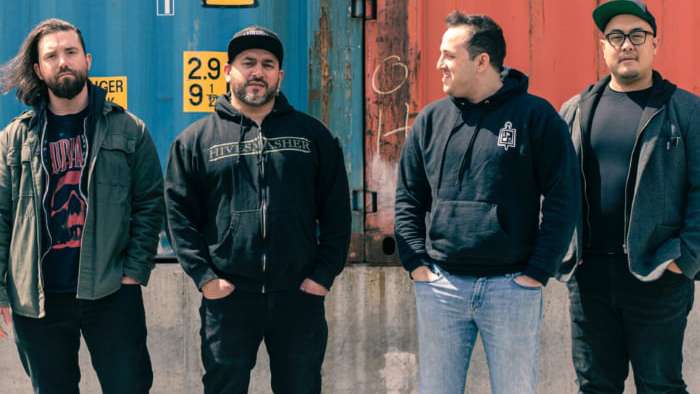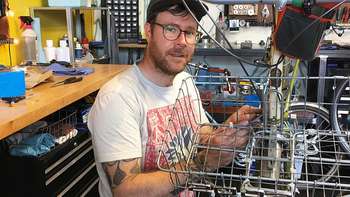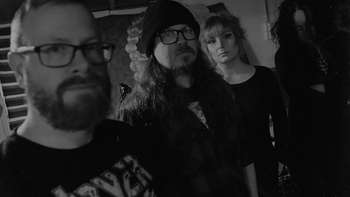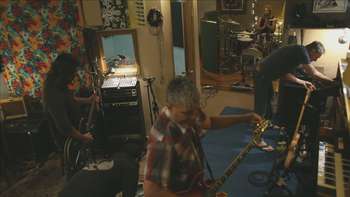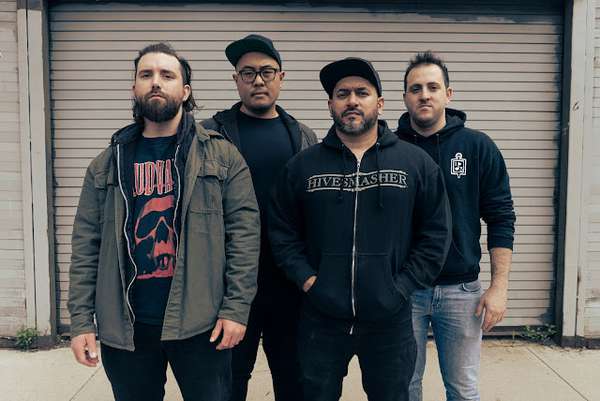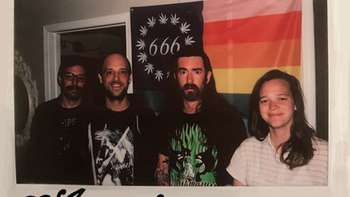There are a lot of misconceptions about the life of a musician. The old rock star image of bright lights and fast living is almost patently false. Most musicians have day jobs – and not just to pay the bills. Jobs provide new challenges, personal fulfillment and, yes, some rent or gas money. And usually when somebody is writing a new record or scheduling a tour, they have to balance that with their job.
How an artist spends their time by day will influence the creative process at night. In Don’t Quit Your Day Job, Scene Point Blank looks at how musicians split their time, and how their careers influence their music or – sometimes – how their music provides escape.
And to contradict ourselves from the getgo, Alec Kossoff of Loss Becomes definitely does live under the bright lights -- as an acrobat and stunt person.
In this edition, we emailed with Kossoff, drummer of Loss Becomes, to learn about physical performance as a career and how that affects playing music.
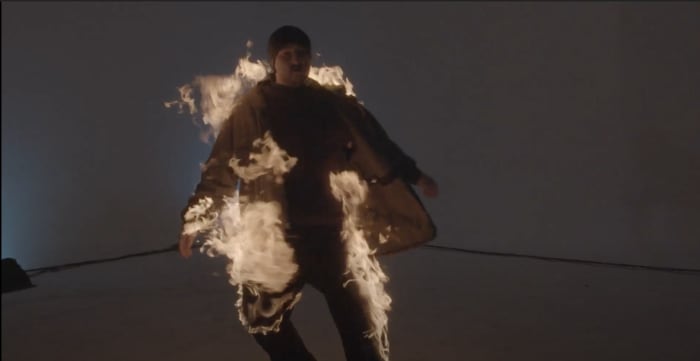
Scene Point Blank: First, can you share a bit about your job title(s) and background? You're a stuntperson/acrobat. Do you have a job title? Are you employed by a company or self-employed?
Alec Kossoff: For the past few years I’ve been a full-time stunt performer and acrobat in NYC.
I started gymnastics when I was 4 years old, started competing when I was 7, started circus (flying trapeze) at 14, and was in my first movie when I was 25.
My job title would technically just be “Stunt Performer”. Both stunt performing and acrobatics are a self-employed, freelance discipline.
Scene Point Blank: Is it an even split between acrobatics and stunts, or are they interchangeable?
Alec Kossoff: Most people in stunts have a background in something. You get people from all over the spectrum: ex-military, high level martial artists, drivers, etc… However, your background usually has to be adapted for stunt performing i.e. learning how to work for a camera and act.
Acrobatics/gymnastics is my background, but very rarely do I get jobs where I have to perform as an acrobat. More often than not, my background influences my skill set to perform specific stunts safely.
For example, due to all of the years of acrobatics, my spatial awareness is very good. Therefore, falling from height or even falling generally is very easy for me because I know how to control my body in the air to land safely with high accuracy.
Scene Point Blank: Is there a popular stunt you've performed that people might recognize, even if they don't know you did it?
Alec Kossoff: Most of my work as a new stunt performer is pretty nondescript. A lot of the time when you are called in, especially as a beginner, if you are doubling you’re there just in case an actor doesn’t want to do something and if you’re called in to be ND stunts (military guy on camera, bad guy #2, henchmen #4 etc…). Your job is generally to be in the background, get shot, and die.
My very first doubling job, I was brought in to be there in case the actor did not want to go into a coffin. I was there to do it should he not want to.
However, my first job was probably my most recognizable. I was an acrobat on The Greatest Showman. This probably gave me the most “camera time” and most people recognize the movie. This is a video from rehearsal for the main stunt I was hired for, but this shot made it into the movie and when I show people, sometimes they remember it.
Scene Point Blank: How did you get interested in this industry and when?
Alec Kossoff: My interest in this industry spawned as my community got more involved in it. I grew up as an acrobat in NYC. This led me to meeting all sorts of very interesting, inspiring people from the parkour, tricking, and circus community. When we got a bit older, all of my friends from these communities started to get involved in performing and stunts. It turned out that half of the community in NYC were just people I grew up with and I had no idea until I worked my first job.
As I mentioned, that job was The Greatest Showman which was filmed (I believe) in 2017. That whole production and how I got hired is a really long story. The short version is that I got hired and had only a month to learn/perform a circus act I had never done before in front of 300 extras, 20 famous dancers, 40 or so Cirque Du Soleil performers, and Hugh Jackman. I was pretty nervous to say the least. However, it was intoxicating. That job, along with the community around it, led me to aspire to be on sets and to get into stunt performing as a full-time endeavor.
Scene Point Blank: What was your job path that led you to physical performance?
Alec Kossoff: I started as a competitive gymnast, then I became a training and eventually working flying trapeze artist. Through my flying trapeze jobs, I got in touch with people who do half-time shows for NBA games and started working that job. I got involved with training trampoline and trampoline-wall as I moved back to NYC from DC where I was going to college in 2014. I got my first stunt job in 2017 and my first trampoline job in 2019.
Scene Point Blank: Is living in New York an essential part of the job or does it provide unique opportunities?
Alec Kossoff: As an acrobat, there are few better places to live than NYC. New York has a robust and active circus community only rivaled by Los Angeles and now Las Vegas. In my opinion, the community is the most important part of succeeding in physical performance. As a stunt performer, you
need to live local to where movies/tv shows are being made to work.
Acquiring work as a stunt performer is a very nuanced process, but there are no agents or casting departments for stunts. All stunt performers are hired by the coordinator directly. So if you do not know coordinators/have coordinators that trust you, you don’t work.
This leaves very specific places where you can live if you want to become involved in the community. NYC happens to be the TV capital of the world. At any given time here, there can be 40-50 productions filming here. The only other major cities that film the quantity that we do are Los Angeles and Atlanta.
Scene Point Blank: When did you first become serious about being a musician and, in comparison, when did you start working in the stunt/acrobats field professionally? In other words, do they overlap and was one "established" before the other?
Alec Kossoff: The music and acrobatic performing life has sort of always coexisted.
I’ve always had a unique love for music and the way that it speaks to people in a way that acrobatics I’ve felt does not. I started playing drums at 14 and was in my first band at 15. I’ve been in bands ever since.
Scene Point Blank: Did playing in bands influence your career choice?
Alec Kossoff: I’ve always felt that following my heart and doing what I love will work for me. I’ve never really subscribed to the ideology of a 9-5.
Growing up, I saw first hand the misery and exhaustion that that life produces. That’s not to say that the life I’m living now is particularly easy, but at least when I show up to work (when I get work), I love every second of it.
I would not necessarily say that playing in bands influenced my career choice, as much as it is a symptom of the ideology of trying to do things I love for a living.
Scene Point Blank: Does your music ever come up on the job?
Alec Kossoff: One of the more surprising and inspiring things for me about being a stunt performer and acrobat is learning how creative all the people you are working with are. It may (or may not) surprise you that I say that most acrobats I work with also have pursued or have a specific love for music. A lot of them are also musicians. I feel that creative people need to have expression and when you’re surrounded by “creatives,” you’ll find that most of that expression is both physical and musical.
Scene Point Blank: Is there a "stereotypical stuntperson"? Tell us a bit about the workplace culture. (Or does it depend on the individual job?) Are there many "creative types"?
Alec Kossoff: Most stunt people that I’ve met, in my opinion, are very different in their discipline. There are so many variations of stunt performing: water stunts, driving, high falls, fire stunts, fighting, and so much more. However, in my experience we all have one thing in common. We are absolutely insane.
I mean that in the most loving way possible. It takes a very specific type of person to want to be thrown off a roof, or slammed on concrete, or lit on fire. It requires a specific type of competitiveness and overall pain-tolerance that is not shared by “normies.”
One of my favorite anecdotal notes about stunts is that there aren’t a lot of secrets. For the most part if someone is being hit by a car, or being thrown down a flight of stairs there aren’t a lot of secrets there. That person is just generally throwing on skating pads (if wardrobe allows – meaning if you can hide the pads without them being seen on camera) and yeeting themself in front of a car or down a flight of stairs. There are obvious nuanced techniques to keep yourself safe i.e. don’t hit your head on a stair or don’t get run over by the car, but for the most part it just takes courage and trust. Trust is a huge part of performing. Trust in your team for a wire or fire gag, trust in the drivers for a big car hit or crash, trust in the equipment for a high fall etc…
I mentioned the creative stuff in my last answer, but the short answer is yes there are a lot of creative people in stunts. Creativity is how stunts get designed, from the gel that keeps people from burning alive, to the rigging that allows for superheroes to throw bad guys 40 yards.
Scene Point Blank: How does the job affect your creative work or schedule with the band? Are there certain times of year, or even hours of the day, that are busies? How does that affect how you write, rehearse or record?
Alec Kossoff: The Loss Becomes guys have been incredibly accommodating with the knowledge that I’m a freelance performer. The industry works on a very specific and difficult clock. People may have heard about this with the most recent IATSE strike. Days on set can be sometimes 15-16 hours. While performers are generally treated better than crew, the hours are still incredibly long and the turnarounds can be difficult.
The notice for jobs, while it used to happen sometimes 12-24 hours before a job, in covid times is now 48-72 hours because you have to take a COVID test and get a negative result to be on set. That schedule can make other endeavors very difficult sometimes. I’m very
lucky to have such understanding band mates when jobs come up that pull me away.
Scene Point Blank: Has your work influenced any specific songs you've released?
Alec Kossoff: I can’t say that it has to be honest. I’ve spent a lot of time trying to figure out how to combine these two passions. In 2019, I shot this playthrough video which was the closest I ever got:
Scene Point Blank: Has a job-injury ever caused Loss Becomes to cancel a show or tour?
Alec Kossoff: The answer to that question is, luckily and thankfully, no.
Scene Point Blank: What advice would you give to others who might be interested in this kind of work?
Alec Kossoff: My first piece of advice to any budding stunt performer is to join SAG-AFTRA.
The next step after joining SAG is just to meet people. Go to training sessions around the city and surround yourself with stunt performers with different backgrounds than you. Meet established performers and coordinators. Demonstrate your skill, but don’t be annoying.
The work will come if you do this well.
Scene Point Blank: Anything you'd like to add?
Alec Kossoff: Thanks so much for asking me these questions. It was really fun to articulate my thoughts in this way. Most of these answers are my opinions only as I am a fairly new stunt performer still and still learning as I go! I hope you enjoyed this :).
Check out previous entries in the Don’t Quit Your Day Job series.
